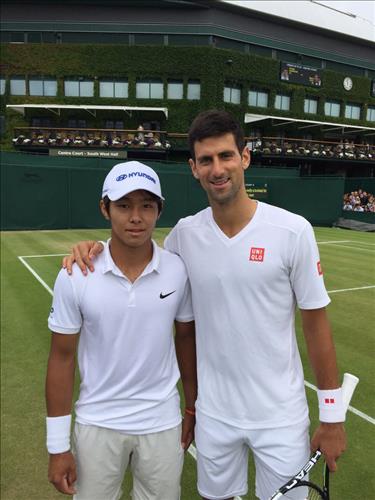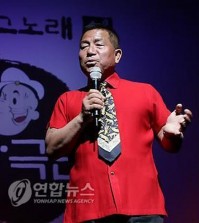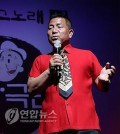- California Assembly OKs highest minimum wage in nation
- S. Korea unveils first graphic cigarette warnings
- US joins with South Korea, Japan in bid to deter North Korea
- LPGA golfer Chun In-gee finally back in action
- S. Korea won’t be top seed in final World Cup qualification round
- US men’s soccer misses 2nd straight Olympics
- US back on track in qualifying with 4-0 win over Guatemala
- High-intensity workout injuries spawn cottage industry
- CDC expands range of Zika mosquitoes into parts of Northeast
- Who knew? ‘The Walking Dead’ is helping families connect
S. Korean Lee Duck-hee trains with world No. 1 Djokovic at Wimbledon

World No. 1 Novak Djokovic poses with Lee Duck-hee of South Korea, who was born deaf and is the No. 2 seed in Wimbledon’s boys singles tournament. Djokovic requested to train with Lee. (Yonhap/S&B Company)
By Brian Han
The life of 17-year-old Lee Duck-hee is quickly becoming an underdog story for the ages.
The South Korean tennis player was born completely deaf, yet he found a way to overcome the odds to pursue his dream of becoming a professional athlete.
Most recently, he entered the Wimbledon’s boys singles tournament as the No. 2 seed competing with the best junior players around the world.
Even the pros can’t help but take notice of Lee’s accomplishments.
World No. 1 Novak Djokovic decided to take him under his wing while they were both in London for the sport’s most prestigious annual event.
In fact, he specifically requested for Lee to be his hitting partner.
The two players trained for an hour together on Tuesday and Djokovic even attended Lee’s second round match against Australia’s Marc Polmans, which lasted a grueling two hours and 43 minutes.
Lee eventually defeated his opponent 6-7, 7-6, 7-9 to move onto the third round.
“I was able to watch Lee’s match yesterday and he put together a really nice, but tough victory,” Djokovic said.
Lee and Djokovic had actually met before during a promotional video shoot for the Australian Open.
Since then the world’s best has been keeping an eye on Lee and sees great things to come.
“His story and his ability to overcome his obstacles is something that can bring hope to a lot of people,” he said.
Rafael Nadal also cited Lee as an inspiration and lauded him for “staying on the right path with his strong determination and mental toughness.”
Hearing can be a very important element to the game, whether it’s for timing shots, listening for line calls or getting verbal cues from umpires.
At the highest level of competition, the slightest advantage or disadvantage can make a significant difference.
But Lee doesn’t see things that way.
“People describe deafness as a disability, but that doesn’t bother me as I see it as my biggest advantage over the other players,” he said during an interview with Vice in May. “It’s my special gift which normal players don’t have. I never get distracted during matches by the crowd, my opponent, anything. It means I can concentrate much more on my own game.”
The bottom line is that he has found a way to make deafness work for him instead of against him.
Lee eventually lost his third round match on Thursday at Wimbledon against Finland’s Patrik Niklas-Salminen, but with his toughness and ability, expect to see this young star to continue his rise in the rankings.















